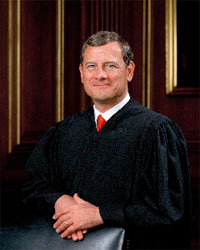Supreme Court upholds disclosure of petitioners’ names

Chief Justice John Roberts (Photo credit: Steve Petteway, Collection of the Supreme Court of the United States)
The U.S. Supreme Court today upheld a law that requires public disclosure of the names of people who signed a petition to put an anti-gay referendum on the ballot in Washington State.
The 8 to 1 decision, with only Justice Clarence Thomas in dissent, said the law requiring records of petition signers to be available to the public, does not violate the First Amendment of the U.S. Constitution.
The decision was written by Chief Justice John Roberts, whose questions, during oral arguments, appeared to indicate he would be inclined to strike down the law.
The case, Doe v. Reed, questioned the constitutionality of a Washington State law that makes public the names and addresses of citizens who sign petitions to put various issues onto the ballot. A group called Protect Marriage Washington and two “John Doe” plaintiffs brought the appeal on behalf of citizens who signed a petition to put a referendum on the ballot—Referendum 71—against a new domestic partnership law. They said the public disclosure of their names violated their right to privacy and freedom of speech. A federal district court judge in Seattle had agreed with them but the 9th Circuit U.S. Court of Appeals did not, so they appealed to the U.S. Supreme Court.
Attorneys for the plaintiffs argued that the “First Amendment protects citizens from intimidation resulting from compelled disclosure of their identity and beliefs and their private associations.”
Chief Justice Roberts said that the State’s interest in preserving the “integrity of the electoral process” was sufficient justification for its Public Records Law (PRA). He said the law helps prevent fraud, mitigates mistakes, and promotes “transparency and accountability in the electoral process.”
He said plaintiffs’ contention that the disclosure law subjected supporters of a referendum on the state domestic partnership law to harassment could not—on that specific referendum—justify striking down the public records law for all referenda.
“Faced with the State’s unrebutted arguments that only modest burdens attend the disclosure of a typical petition,” wrote Roberts, “plaintiffs’ broad challenge to the PRA must be rejected.” He suggested plaintiffs might have more luck with a more narrowly focused legal challenge.
During oral argument, Justice Antonin Scalia, the court’s most staunch conservative and a consistent vote against pro-gay positions, said the First Amendment did not protect citizens “from criticism or even nasty phone calls when you exercise your political rights to legislate, or to take part in the legislative process.” It was essentially the same point made by five national gay legal and political groups in their friend-of-the-court brief. The gay brief was filed by Lambda Legal Defense and Education Fund, Gay and Lesbian Advocates and Defenders, and the National Center for Lesbian Rights, along with the Human Rights Campaign and the National Gay and Lesbian Task Force.
Scalia wrote an opinion concurring in the judgment, as did several of the other justices.


Leave a Reply